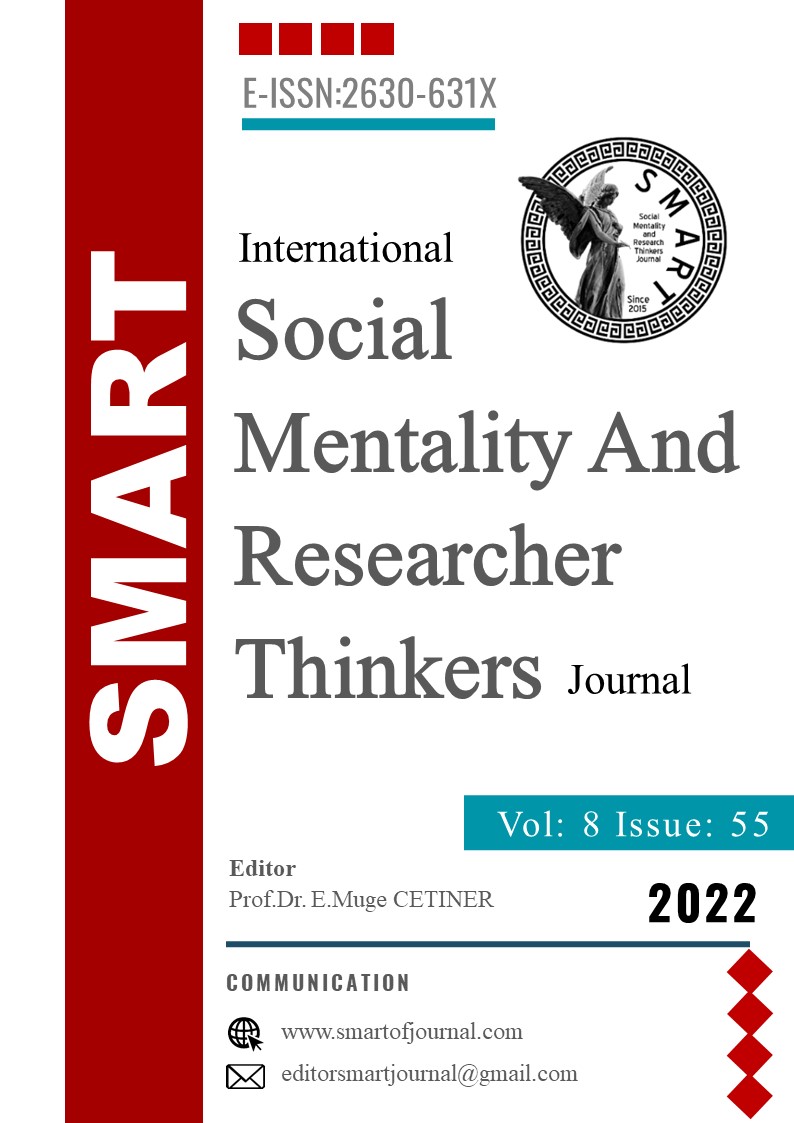Author :
Abstract
Şiir, iletişimi sağlayan dilin en önemli unsurlarından biridir. Duygu, düşünce ve inanışlar şiir aracılığıla somut bir form halinde nesilden nesile aktarılır. Kâbe’nin duvarlarına asılacak bir mevkiye ulaşan şiir, İslam tarihinde edebiyat ve münazaralarda hakem rolünü üstlenmiştir. Bu denli etki gücü yüksek olan şiirin, bir istişhad yöntemi olarak tefsir çalışmalarına da yön verdiği malumdur. Şiirle istişhâd, delil olarak dil kurallarının tesbitinde kullanıldığı gibi Kur’ân âyetlerinin doğru anlaşılıp yorumlanmasında da tercih edilmiştir. Şiirle istişhâd, daha sonraki dönemlerde müfessirler arasında âyetlerin dilsel tahlillerinde ve yorumlanmasında kullanılan önemli bir değer olmuştur. Tâhir b. Âşûr’un Arap diline olan hâkimiyeti, onu dili etkin kullanarak âyetleri yorumlamaya sevk etmiştir. O, et-Tahrîr ve’t-Tenvîr adlı tefsirinde Arap dilini ve önemli bir parçası olan şiiri yoğun kullanarak âyetleri yorumlama yoluna gitmiştir. Dolayısıyla şiirle istişhâd, eseri ayrıcalıklı kılan bir hususiyet olmuştur. İbn Âşur’un, et-Tahrîr ve’t-Tenvîr adlı tefsirinde şiir ile istişhâdı yoğun olarak kullanması ve istişhâdın Kur’ân âyetlerinin yorumlanmasına etki ve katkısının tespiti gibi durumlar bizi böyle bir çalışmaya sevk etmiştir. Bu makalede Tâhir b. Âşûr’un et-Tahrîr ve’t-Tenvîr’inde şiirle istişhâd anlayışı belirlenmeye çalışılmıştır. Bu bağlamda tefsirde şiirleri delil gösterilen şairler, şiirle istişhâd türleri, Tâhir b. Âşûr’un şiirle istişhâd yöntemi ve istişhadın dayanağını belirleme gibi konular ele alınmıştır. Arap dil ve belâgatına vakıf bir müellif olan İbn Âşûr’un, şiirle istişhâdı esas alarak Kur’an ayetlerine yönelik yorumlarının ortaya çıkarılması farklı bir önemi haizdir.
Keywords
Abstract
Poetry is one of the most influential aspects of language for communication. Through poetry, emotions, thoughts, and beliefs are passed down from generation to generation in a concrete form. Poetry, which has gained a footing of being put on the Kaaba’s walls, has taken the role of arbitrator in literature and debates in the history of Islam. As known by all, the poem, which has such a high power of influence, also directs the studies of tafsir as a way of reasoning method. Reasoning with poetry is exercised as evidence for establishing the rules of language, as well as for correctly understanding and interpreting the verses of the Qur'an. Reasoning by poetry became an influential value used in linguistic context and interpretation of verses among commentators in subsequent periods. Tahir b. Ashur’s well-commandment of the Arabic language prompted him to interpret the verses through referring to the language effectively. In his tafsir entitled et-Tahrîr ve’t-Tenvîr, he resorted to the Arabic language and poetry, which is a significant component of it, to interpret the verses. Therefore, reasoning with poetry has been the feature granted the work specially privileged. The determination of the effect and contribution of reasoning to the interpretation of the Qur'anic verses, as well as Ibn Ashur’s extensive use of poetry and reasoning in his commentary named et-Tahrîr ve’t-Tenvîr, have prompted us to carry out such a study. In this article, the concept of reasoning with poetry in Tahir b. Ashur’s et-Tahrîr ve’t-Tenvîr has been attempted to be determined. In this context, issues such as poets whose poems were presented as evidence in tafsir, forms of reasonings with poetry, Tahir b. Ashur’s reasoning approach by poetries, and defining the basis of the reasoning were discussed in detail. Therefore, it is of great importance to reveal the interpretations of Ibn Ashur, who is an author with a command of the Arabic language and rhetoric, on the verses of the Qur'an based on poetry and reasoning.
Keywords
- Ahmîdân, H. (2012). “eş-Şâhidu’ş-Şi‘r fi’t-Tahrîr ve’t-Tenvîr-Tasnîf ve’d-Dirâse” , Doktora Tezi, Seyyid
- Ahmîdân, H. (2012). “eş-Şâhidu’ş-Şi‘r fi’t-Tahrîr ve’t-Tenvîr-Tasnîf ve’d-Dirâse” , Doktora Tezi, Seyyid Muhammed b. Abdullah Üniversitesi, Fas.
- ‘Akkâvî, İ. F. (1996). el-Mu’cemu’l-Mufassal fi ulûmi’l-belâgati ve’l-Bedî’ ve’l-Me’ânî, (Thk.: Ahmed Şemseddîn), Beyrut, Lübnan.
- Askerî, E.H. (1997). Kitâbü Sınâ'ateyin-nazm ve'n-nesr, Dâru'l-Kutubu’l-'İlmiyye, Beyrut.
- el-Bağdâdî, A. (1997). ’Hizânetü’l-edeb, (Thk.: Abdüsselâm Muhammed Hârûn), Mektebetü’l-Hancî, Kahire. Bedevî, T. (1997). Mu’cemü’l-belâgati’l-’’Arabiyye, (4. Baskı), Dârü İbn Hazm, Beyrut.
- el-Berrî, H. (2002). Mekâyîsü’l-Belâğiyye fî Tefsîri et-Tâhrîr ve’t-Tenvîr li Muhammed Tâhir b. Âşûr, Dâru’l- Fâris, Amman.
- Bolelli, N. (2015). Belâgat (Beyân-Me’ânî- Bedî’ İlimleri) Arap Edebiyatı, (9. Baskı), M.Ü. İlâhiyat Fakültesi Vakfı Yayınları Nu: 72, İstanbul.
- Bürd, B. (1976). Dîvânü Beşşâr b. Bürd, I-III, (Thk.: Tâhir b. Âşûr), Tunus.
- Coşkun, A. (1999).“İbn Âşûr Muhammed Tâhir”, Diyanet İslam Ansiklopedisi (DİA), (XIX): 332-335. Develioğlu, F. (1983). Osmanlıca-Türkçe Büyük Lügat, İstanbul.
- Durmuş, İ. (1999). “İbn Ebü’l-İsba”, Diyanet İslam Ansiklopedisi (DİA), (XIX): 467-468.
- el-Ğâli, B. (1996). Min a‘lâmi’z-Zeytûne Şeyhu’l-Câmi‘i’l-A‘zam Muhammed et-Tahir İbn Âşûr, hayâtuhû ve âsâruhû, Dâr-u İbn Hazm, Beyrut.
- el-İsfahânî, E. F. (1986). el-Egânî, (Thk.: Semîr Câbir), Dâru’l-Kutubu’l-’İlmiyye, Beyrut.Koçak, İ. (1988). “Ahfeş el-Ekber”, Diyanet İslam Ansiklopedisi (DİA), (I): 525.
- Mecdi, V. (1979). Mu ’cemü’l-mustalahâti’l-’Arabiyyi fi’l-luğa ve’l-Edeb, Beyrut.
- Mûhtât, İ. (1992). Mukârebetü’ş-Şahidü’ş-Ş’iriyyi fi ‘l-Kütübi ‘n-Nekdiyye ve’l-Belâğiyye, Dirasat’ul- ‘Ulyâ, Ribat.
- el-Mühendis, K. (1979. Mu ’cemü’l-mustalahâti’l-’Arabiyye fi’l-luğa ve’l-edeb, Beyrut.
- el-Müncid, M. B. (1986). el-İtticâhü’l-İslâmî fi’ş-şi'ri’l-Endelüsî fî 'ahdey Mülûki’t-tavâif ve’l-Murâbıtîn, Beyrut.
- İbn Âşûr, T. (1984). et-Tahrîr ve’t-Tenvîr, XXX, Darü't-Tunus.
- İbnü’l-Hoca, M. H. (2008). Şeyhu’l-İslâm el-İmâmu’l-Ekber Muhammed et-Tâhir İbn Âşûr ve Kitâbuhu Mekâsıdu’ş-Şerî ‘eti’l-İslâmiyye, Dâru’l-’Arabiyye, Tunus.
- İbn Manzûr, E.F. (1963). Lisânü’l-‘Arab, XX, Dâru's- Sadr, Beyrut.
- İbn Reşîk, K. (1972. el-’Umde fî mehâsini’ş-Şi’r ve âdâbihi ve nakdi, Beyrut.
- el-Mâlikî, M. A. (1994). Cuhûdu’t-Taberî fî Dirâseti’ş-Şevâhidi’ş-Şi’riyye fi Câmi‘i’l-Beyân ‘an Te‘vîli Ayi’l- Kur’ân, Dirâsetü’l-luğeviyyetü'l-Edebiyye fi’t-Tefsîri’l-Kur’an-i’l-Kerîm, Zehru’l-Mihrâz, Fas.
- Matlub, A. (1996). Mu’cemü’l-Mustalahâti’l-Belâğiyye ve Tatavvürîhâ (2. Baskı), Mektebetü Lübnan, Beyrut. Pala, İ. & Durmuş, İ. (2001). “İ’tilâf”, Diyanet İslam Ansiklopedisi (DİA), (XXIII): 459-460.
- Hittî, H. N. (1992). Şerh-u Divânu Züheyr ibn Ebi Sülmâ, Beyrut.
- Sâmir, H. (1994). Şeyh Muhammed Tâhîr b. Âşûr ve Menhecuhu fî Tefsîri’t-Tahrîr ve’t-Tenvîr, Miftâhu’l-Ulâ Dârus-Sakâfe, ed-Davha.
- Süyûtî, E. F. (2006). el-İktirâh fî usûli’n-nahv, (Thk.: Abdulhakim ‘Atiyye-Alauddin ‘Atiyye), Daru’l-Beyrutî.eş-Şehrî, A. (1431). eş-Şâhidu’ş-Şi’riyyu fi Tefsîri’l-Kur’an-i’l-Kerîm, Ehemmiyyetühu ve eseruhu ve Menâhicu’l-Müfessirîn fi’l-İstişhâd bihi, Mektebetü Dâru’l-Minhâc, Riyâd.
- Özbalıkçı, M. R.(1992). “Batalyevsî”, Diyanet İslam Ansiklopedisi (DİA), (V): 138-139.
- ez-Zebîdî, E.F. (2012).Tâcü’l-Arûs min Cevâhiri’l-Kâmûs, (Thk.: Abdulmun‘im Halil İbrahim-Muhammed Mahmud), Dâru’l-kutubi’l-İlmiyye, Beyrut.
- ez-Zemerlî, S. (1986). A’lâmün Tûnisiyyûn, Dâru’l-Garbi’l-İslâmî, Beyrut.
- ez-Zübyânî, N. (1986). Divanun-Nabigatu’z-Zübyânî, (Nşr.: Tâhir b. Âşûr, eş-Şeriketü’t-Tûnusiyetü lit-Tevzî ‘î), Tûnus





